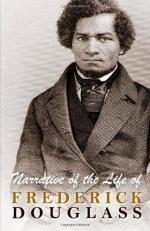While I lived with my master in St. Michael’s, there was a white young man, a Mr. Wilson, who proposed to keep a Sabbath school for the instruction of such slaves as might be disposed to learn to read the New Testament. We met but three times, when Mr. West and Mr. Fairbanks, both class-leaders, with many others, came upon us with sticks and other missiles, drove us off, and forbade us to meet again. Thus ended our little Sabbath school in the pious town of St. Michael’s.
I have said my master found religious sanction for his cruelty. As an example, I will state one of many facts going to prove the charge. I have seen him tie up a lame young woman, and whip her with a heavy cowskin upon her naked shoulders, causing the warm red blood to drip; and, in justification of the bloody deed, he would quote this passage of Scripture—“He that knoweth his master’s will, and doeth it not, shall be beaten with many stripes.”
Master would keep this lacerated young woman tied up in this horrid situation four or five hours at a time. I have known him to tie her up early in the morning, and whip her before breakfast; leave her, go to his store, return at dinner, and whip her again, cutting her in the places already made raw with his cruel lash. The secret of master’s cruelty toward “Henny” is found in the fact of her being almost helpless. When quite a child, she fell into the fire, and burned herself horribly. Her hands were so burnt that she never got the use of them. She could do very little but bear heavy burdens. She was to master a bill of expense; and as he was a mean man, she was a constant offence to him. He seemed desirous of getting the poor girl out of existence. He gave her away once to his sister; but, being a poor gift, she was not disposed to keep her. Finally, my benevolent master, to use his own words, “set her adrift to take care of herself.” Here was a recently-converted man, holding on upon the mother, and at the same time turning out her helpless child, to starve and die! Master Thomas was one of the many pious slaveholders who hold slaves for the very charitable purpose of taking care of them.




